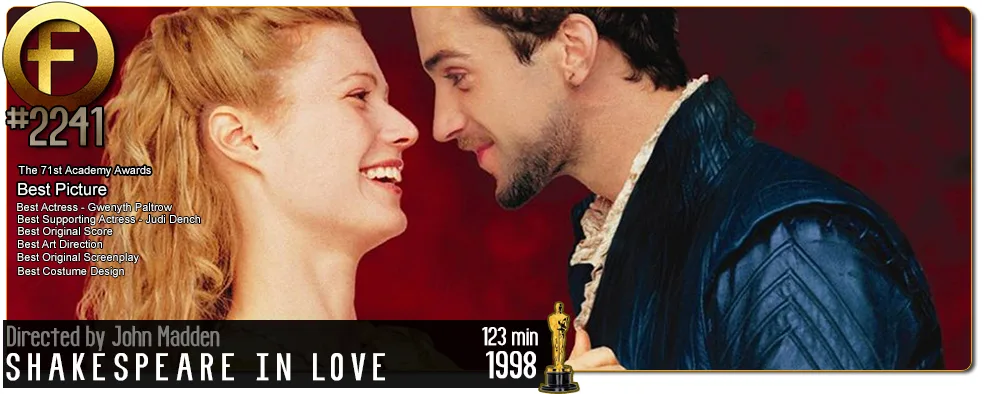Movie Review – Shakespeare In Love
Principal Cast : Gwyneth Paltrow, Joseph Fiennes, Geoffrey Rush, Colin Firth, Ben Affleck, Judi Dench, Simon Callow, Jim Carter, Martin Clunes, Antony Sher, Imelda Staunton, Tom Wilkinson, Mark Williams, Daniel Brocklebank, Nicholas Le Prevost, Jill Baker, Patrick Barlow, Joe Roberts, Rupert Everett, John Inman, Sandra Reinton.
Synopsis: The world’s greatest ever playwright, William Shakespeare, is young, out of ideas and short of cash, but meets his ideal woman and is inspired to write one of his most famous plays.
********
If all the world’s a stage, then it’s only fitting that the great Bard should, at some point, be the star of it. The intricacies of Shakespeare in Love, a film that transcends the boundaries of time with its timeless allure, remains an enchanting, if infuriating, masterpiece, featuring an exceptional screenplay, solid direction, and captivating performances, and has etched its place in the annals of cinematic excellence. However, it is imperative that we address the lingering controversy surrounding its Best Picture win at the 71st Academy Awards, where it triumphed over the equally remarkable Saving Private Ryan, something that continues to anger me to this day.
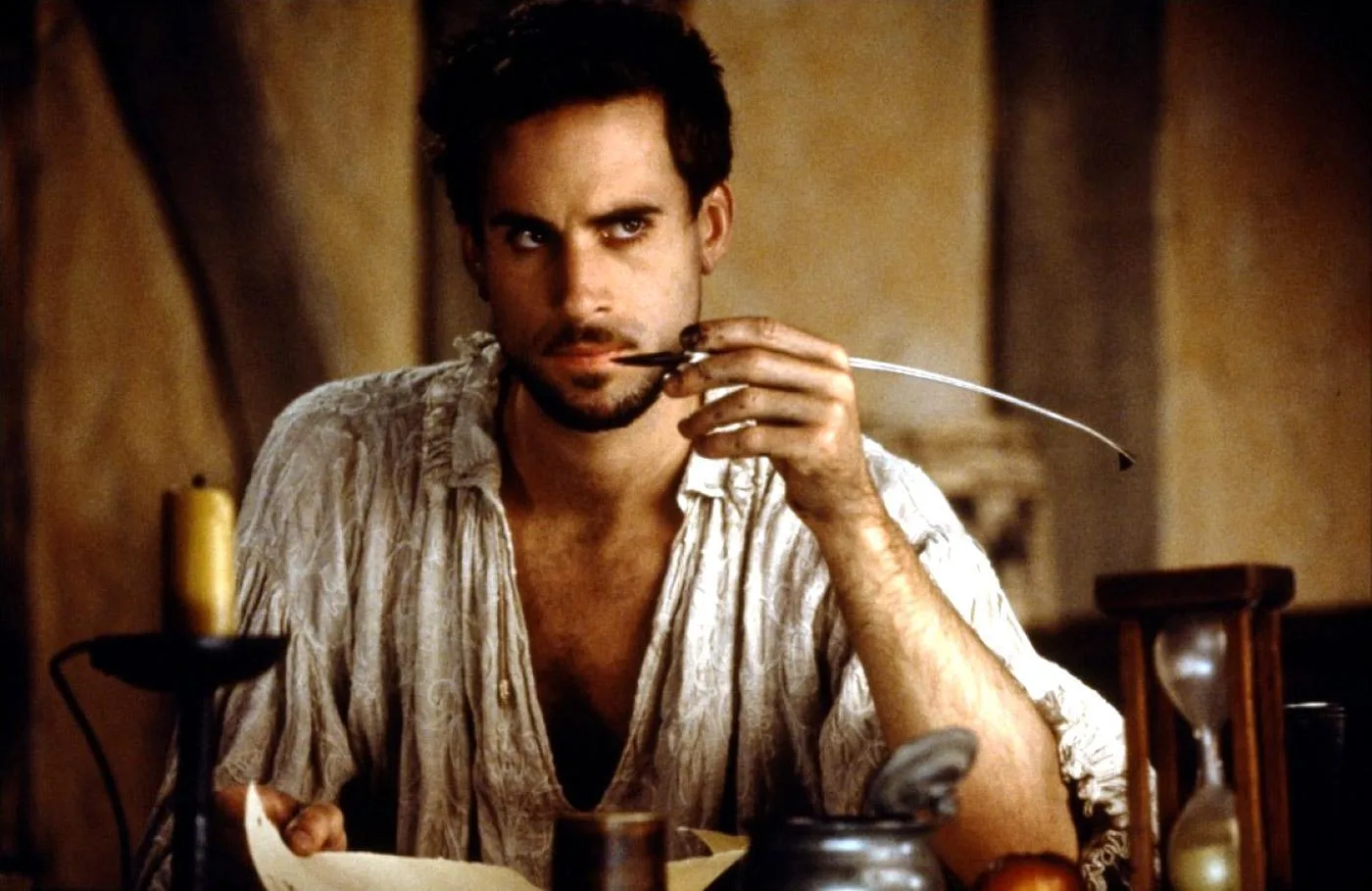
The young and charismatic William Shakespeare (Joseph Fiennes) grapples with writer’s block and seeks inspiration for his next play. His world is transformed when he encounters Viola de Lesseps (Gwyneth Paltrow), a spirited and talented actress who defies the conventions of her time by disguising herself as a man to pursue her passion for the stage. As their passionate and clandestine love affair unfolds, it becomes the muse for Shakespeare’s greatest masterpiece, “Romeo and Juliet.” It an exquisite tapestry of romance, wit, and theatrical brilliance, capturing the essence of a bygone era while celebrating the enduring power of love and art.
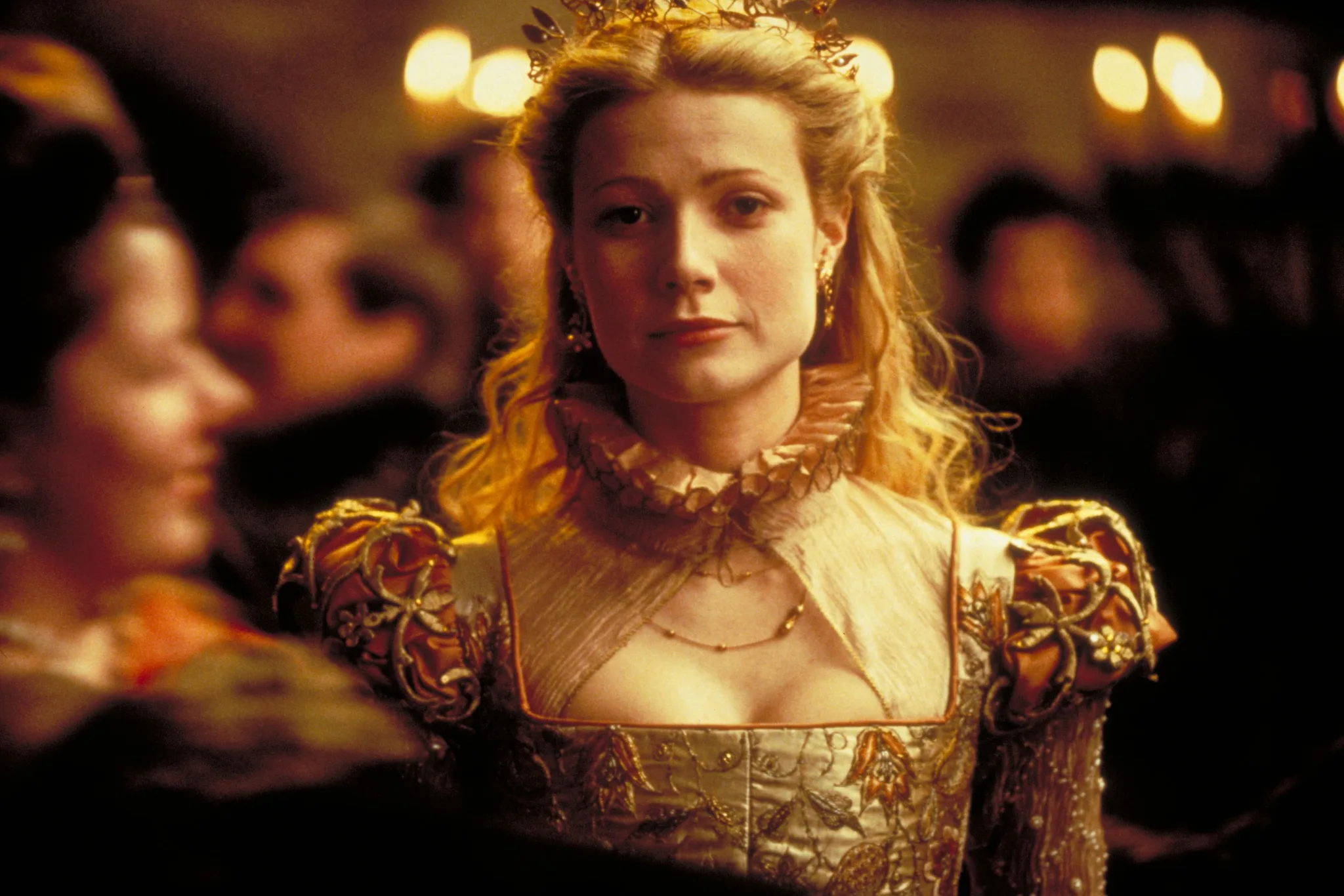
At the core of Shakespeare in Love lies its meticulously crafted screenplay, the brainchild of Marc Norman and Tom Stoppard. The narrative transports us to Elizabethan London, portraying the young and charismatic William Shakespeare’s relentless quest for creative inspiration. It is, in essence, an elegant tapestry of eloquence, humour, and a profound love for the literary craft. The screenplay, distinguished by its sharp dialogue and subtle allusions to the Bard’s oeuvre, resonates with intellectual acumen and exquisite wit. It masterfully balances the historical romance and literary tribute, encapsulating the brilliance of Shakespeare’s language while weaving a beguiling tale of love and artistic innovation. With every line, the screenplay conjures the aura of Elizabethan England, immersing the audience in an era of grandeur and intrigue.
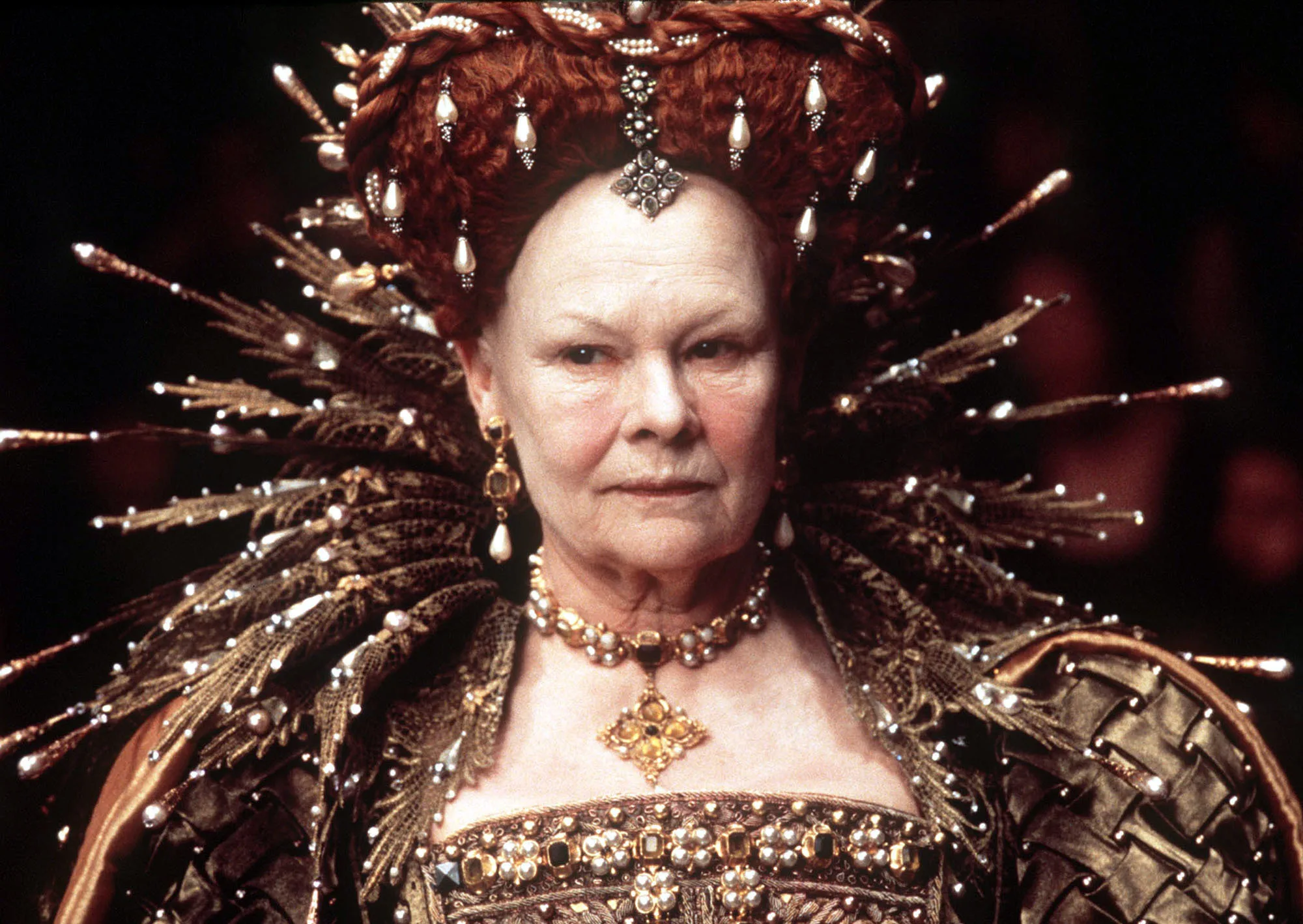
Shakespeare in Love would not be the cinematic gem it is without the deft direction of John Madden. His vision elevates the film from a mere period piece to a work of cinematic artistry. With an astute eye for detail and an ability to orchestrate intricate scenes, Madden leads the audience through the labyrinthine plot with consummate finesse. Madden adeptly navigates the film’s intricate storyline, guiding the audience through the tumultuous romance between Shakespeare and Viola de Lesseps. His exceptional ability to harmonize the whimsy of the Shakespearean theatre with the tender moments of the narrative is a testament to his unparalleled talent. The film’s tempo and cadence are impeccable, leaving the audience spellbound and yearning for more.
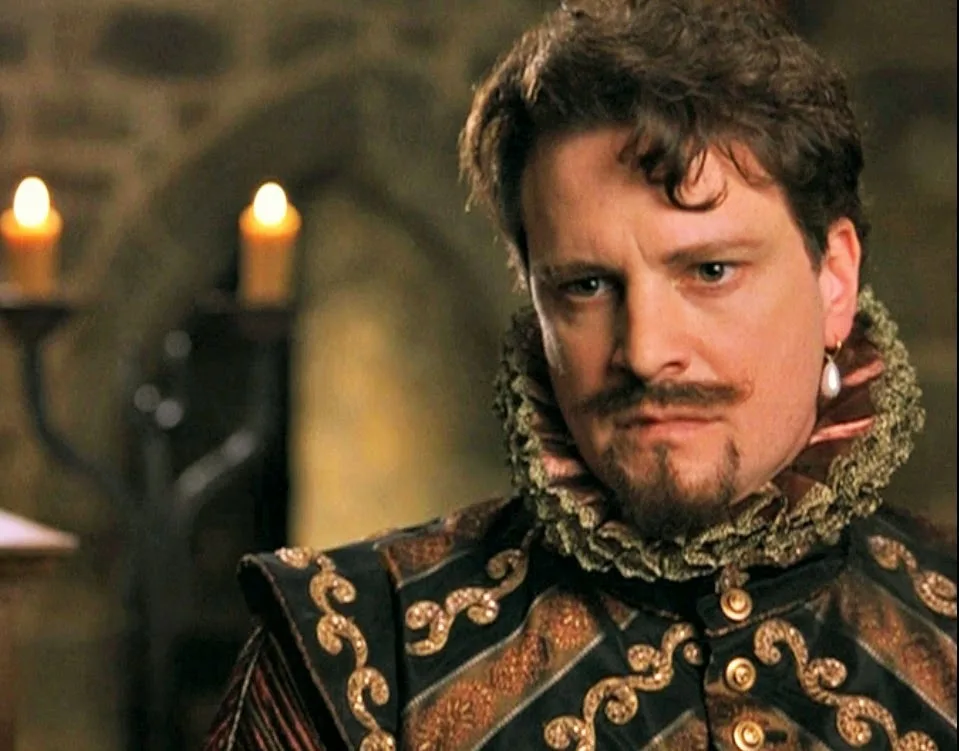
The film’s exceptional cast plays an integral role in its success. Gwyneth Paltrow, in her Oscar-winning portrayal of Viola de Lesseps, exudes a luminous beauty and grace that captures the essence of her character’s allure. Her performance embodies the fervour of a passionate, aspiring actress who dares to challenge the gender constraints of her era. Joseph Fiennes, as the young Shakespeare, is equally captivating. He embodies the playwright with charisma, wit, and vulnerability, effectively conveying the intensity of his artistic spirit and his profound love for Viola. The supporting ensemble, including Geoffrey Rush (who had won an Oscar playing David Helfcott in Shine only a year or two prior) as the calculating yet endearing Philip Henslowe, Judi Dench as the formidable Queen Elizabeth I, and Ben Affleck as the bumbling Ned Alleyn, adds depth to the narrative. Each actor contributes to the story, rendering the characters memorable and empathetic.
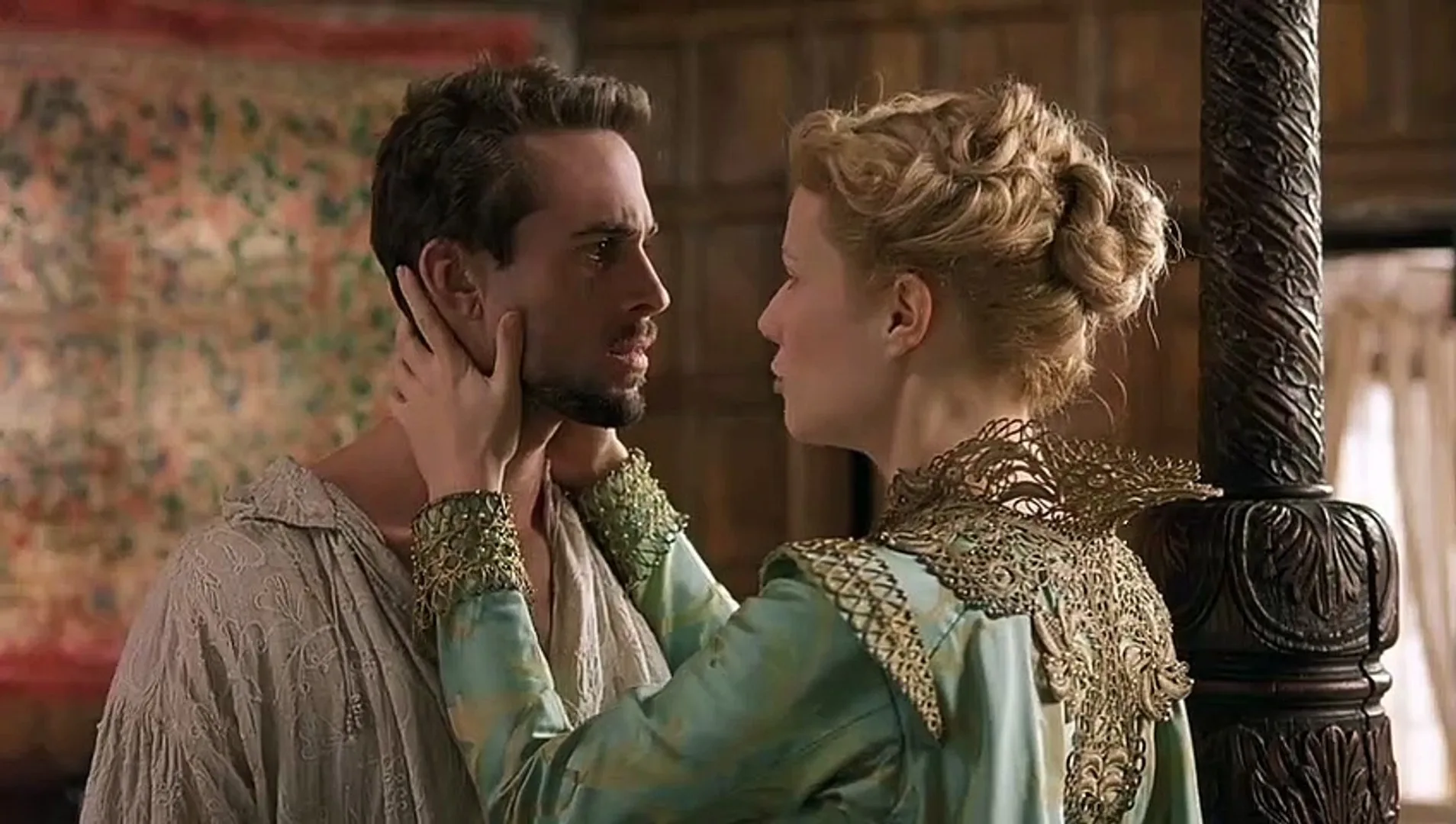
The film’s production design, under the stewardship of Martin Childs, is a visual spectacle. The meticulous re-creation of Elizabethan London, from the bustling theatres to the grand palaces and taverns, immerses the audience in the world of Shakespeare. The attention to detail, evident in the sets, costumes, and props, is truly extraordinary. Shakespeare in Love celebrates the opulence and vibrancy of the Elizabethan era, while also highlighting the harshness and grime of life during that period. It is a visual banquet that transports the audience to a bygone era, allowing us to partake in the world that shaped Shakespeare’s life and artistry.
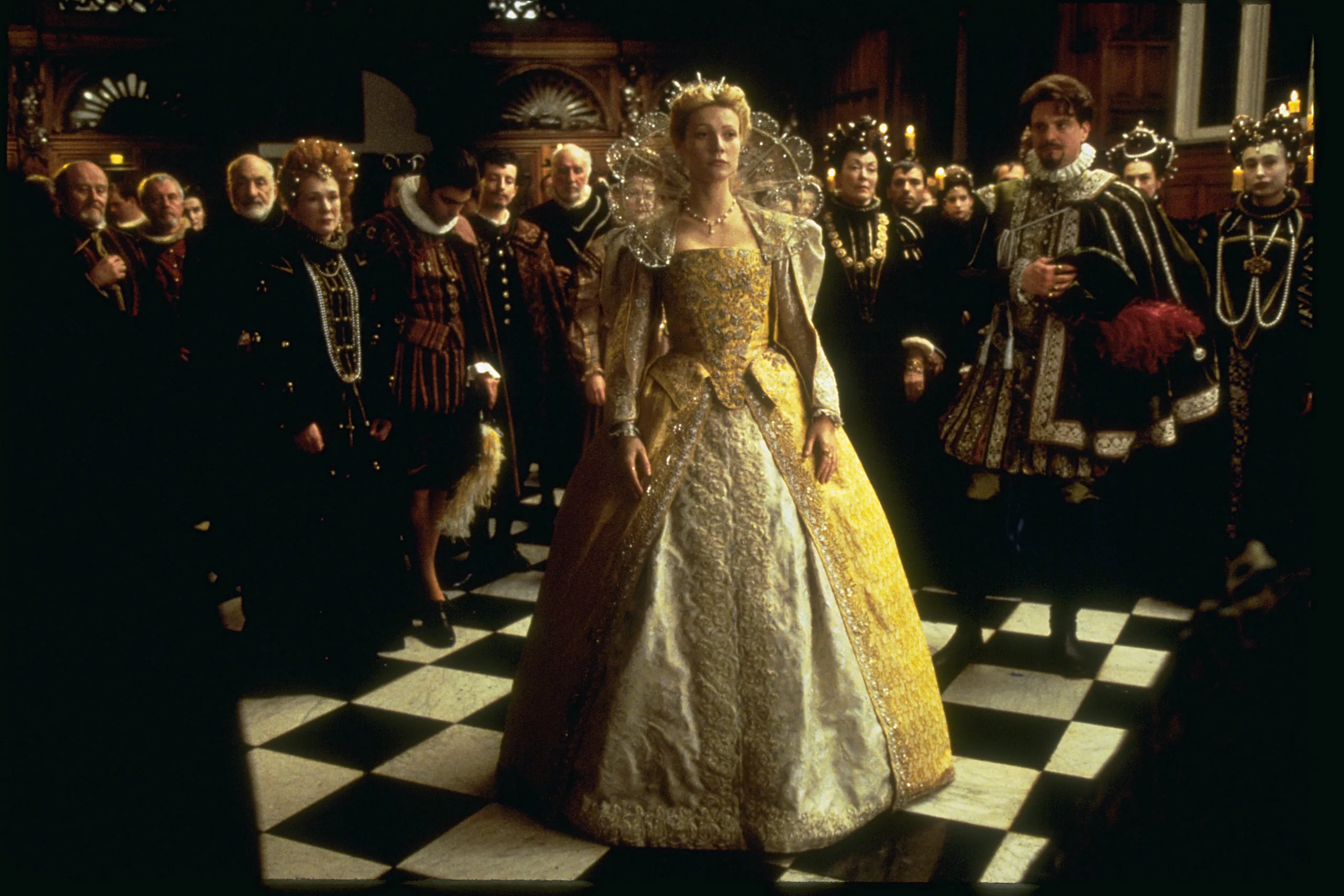
Music has always played a pivotal role in Shakespearean drama, and the film’s composer, Stephen Warbeck, weaves a score that harmonizes seamlessly with the narrative. His use of period instruments and melodies captures the essence of the era, enriching the emotional depth of the film. The musical score accentuates the romantic and dramatic moments, intensifying the audience’s connection with the characters and their journeys. Warbeck’s artistry ensures that the music of Shakespeare in Love lingers in our hearts long after the final credits roll.
Despite the enchantment of Shakespeare in Love, its Best Picture win at the 71st Academy Awards in 1999 remains enshrouded in controversy. The film emerged victorious over the compelling war epic Saving Private Ryan, directed by Steven Spielberg. Many film connoisseurs, critics, and admirers of Spielberg found this decision perplexing and, in some cases, vexing. Saving Private Ryan, renowned for its unflinching portrayal of the D-Day landing and the emotional toll of World War II, is an extraordinary cinematic achievement. Spielberg’s direction, Tom Hanks’s poignant performance, and the film’s ground-breaking cinematography and sound design set it apart as one of the most powerful war films in history. The controversy surrounding the Best Picture win is frequently ascribed to the Academy’s preference for period dramas and romantic narratives over the raw realism of war. Shakespeare in Love was undeniably a charming and exquisitely crafted film, but was it genuinely more deserving of the top accolade than Saving Private Ryan? This inquiry endures as a topic of debate among film aficionados to this day.
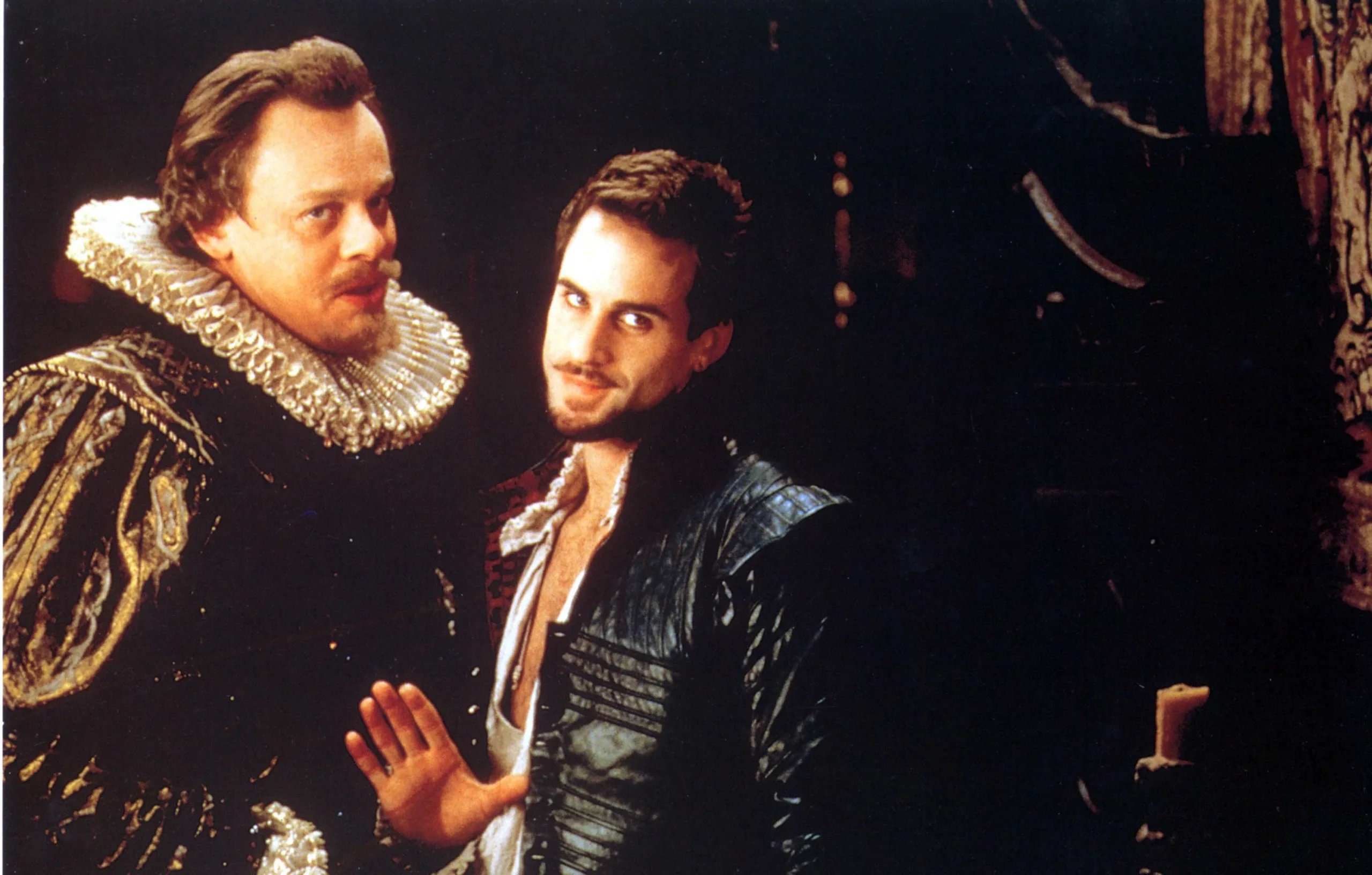
To comprehend the controversy, it is imperative to acknowledge the contextual backdrop. The Academy Awards have a proclivity for favouring certain genres and styles of filmmaking over others. Period dramas and romantic narratives have historically garnered more acclaim than war films, science fiction, or fantasy. This inclination is discernible in other instances, such as Forrest Gump prevailing over Pulp Fiction in 1995 or The King’s Speech trumping Inception in 2011. While Shakespeare in Love is unquestionably a cinematic jewel, the decision to bestow upon it the Best Picture accolade in lieu of Saving Private Ryan remains divisive. Many opined that the Academy’s inclination towards the former genre influenced a choice that did not align with the cultural impact and significance of Spielberg’s war epic.
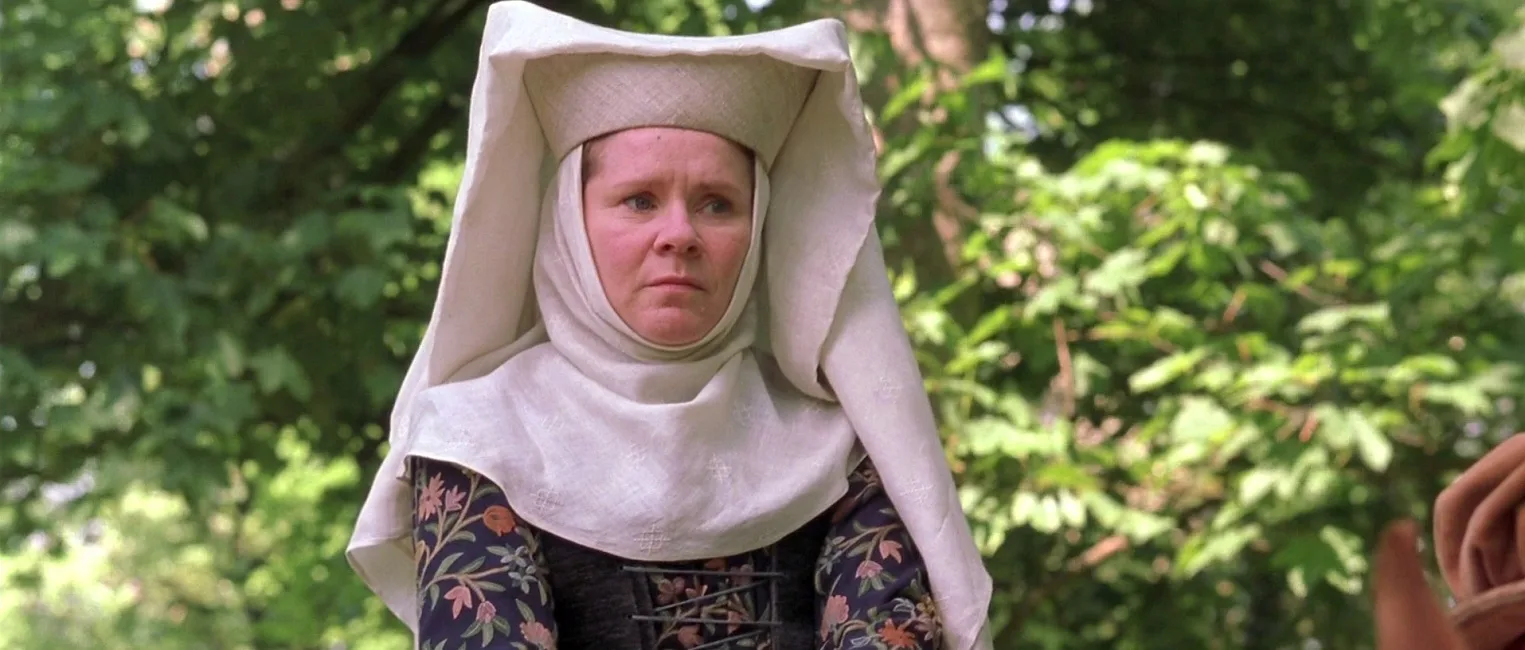
Over the years since its release, Shakespeare in Love has retained its allure and evolved into a beloved classic. Nonetheless, its cultural impact may have waned compared to the enduring resonance of Saving Private Ryan. Saving Private Ryan left an indelible imprint on the war film genre. Its unflinching and visceral depiction of warfare redefined how audiences experienced on-screen conflict. The film’s iconic opening sequence, portraying the D-Day landing, is universally acknowledged as one of the most potent and harrowing moments in cinematic history. It set a new benchmark for authenticity in war films and served as an inspiration for countless other movies to strive for similar realism. Furthermore, Saving Private Ryan rekindled interest in World War II and ignited discussions about the sacrifices made by the Greatest Generation. It contributed to the ongoing dialogue about the importance of remembering and learning from history. The film’s impact on the genre and its cultural significance have remained robust over time.
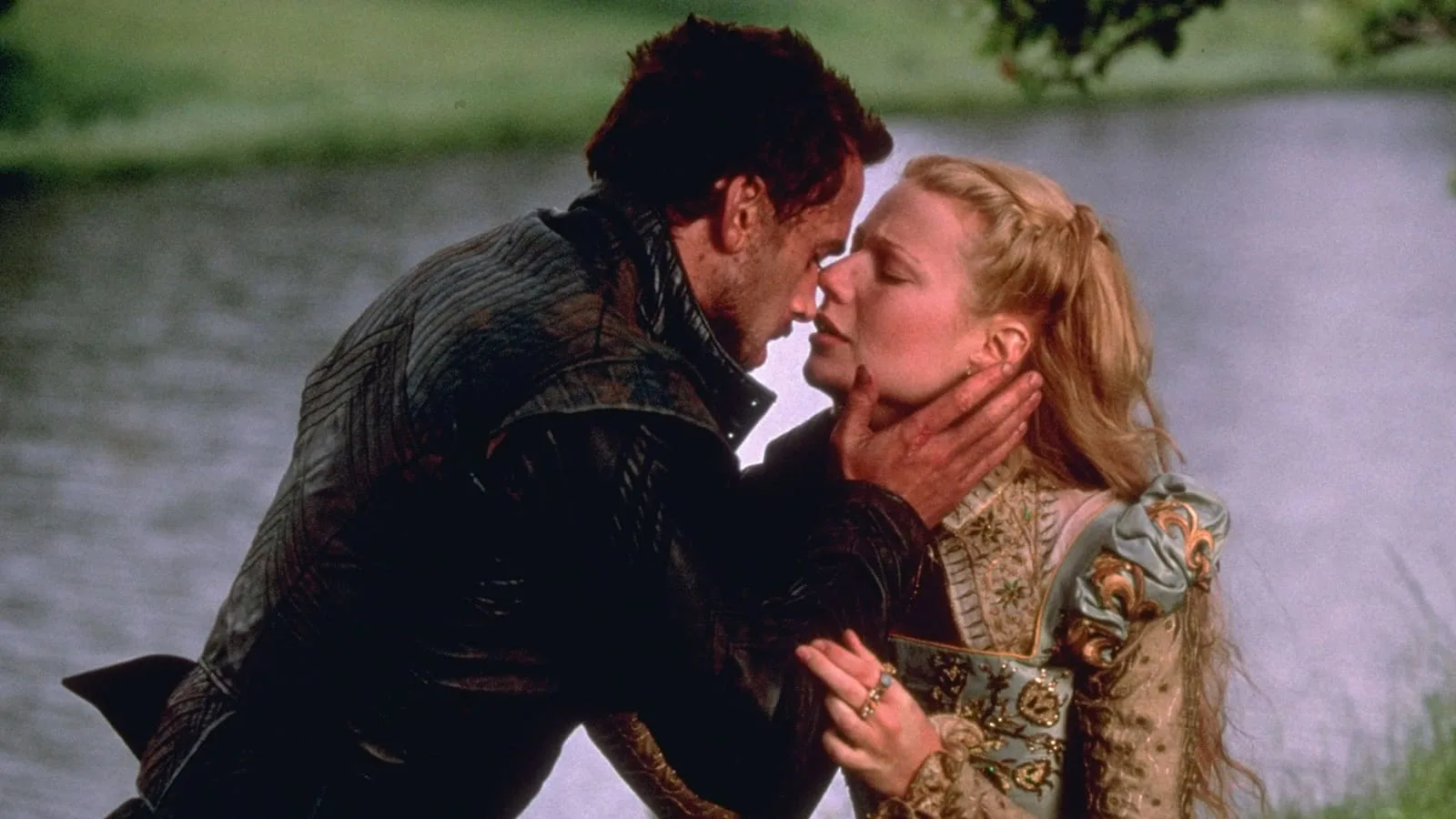
In contrast, while Shakespeare in Love remains a delightful film with enduring appeal, it may not have possessed the same enduring cultural impact. Its influence is primarily artistic and cinematic, celebrated for its witty screenplay and exceptional acting, rather than for its broader cultural resonance. Shakespeare in Love is an enchanting and timeless cinematic masterpiece, renowned for its captivating screenplay, masterful direction, and brilliant performances. Its production design and musical score contribute to its immersive quality.
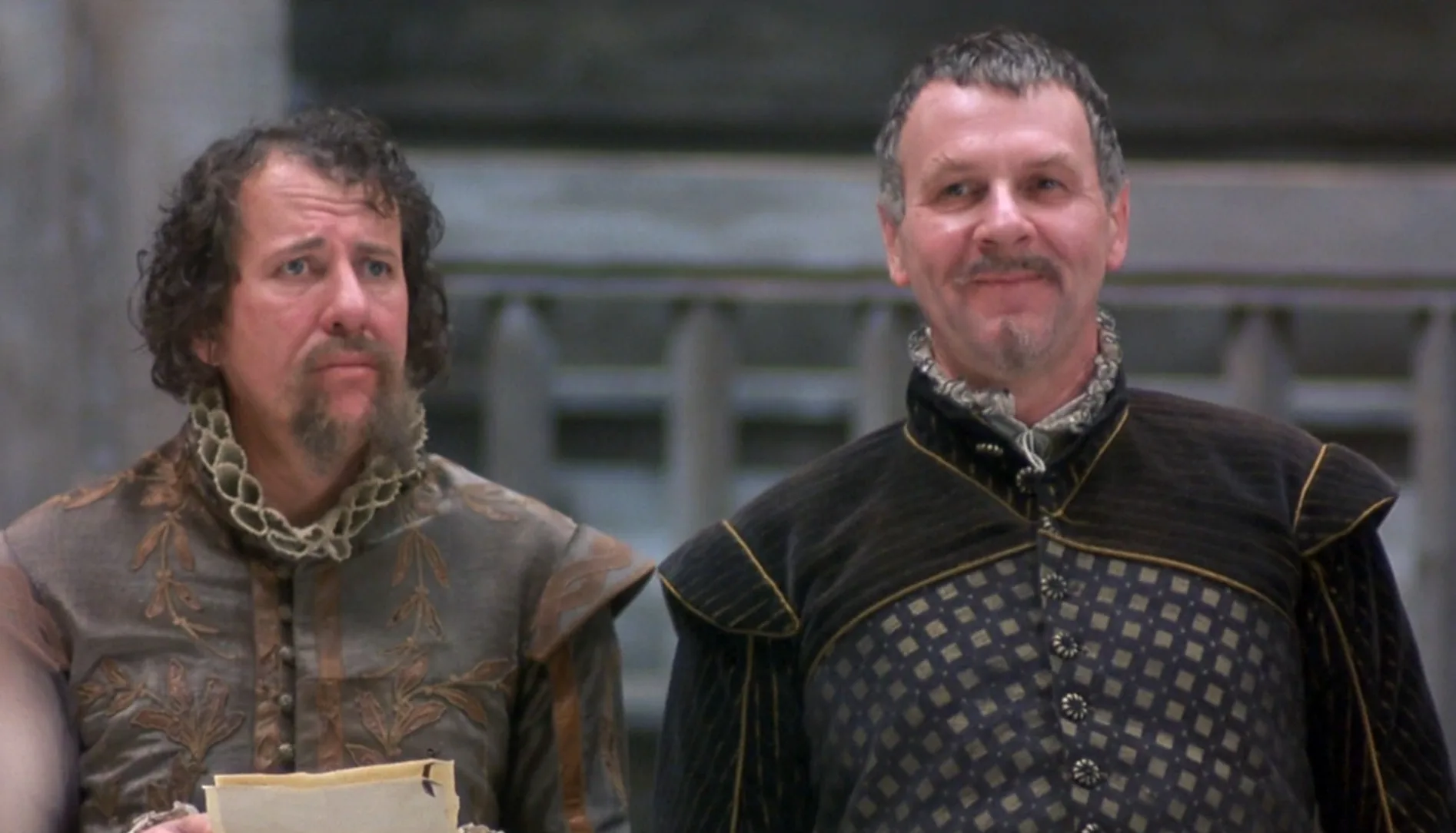
Shakespeare In Love remains a fascinating curio from the Academy. It’s a terrific film, hugely entertaining and filled with great performances under a solid, where-has-he-gone director in John Madden. Overshadowed by its Best Picture shock win, however, and perhaps destined to remain known as the film that beat Saving Private Ryan rather than as an excellent film in its own right, Shakespeare In Love deserves your attention and admiration for achieving what it sets out to, and with quite exquisite craft.
Note: This review was written by the author with additional material provided through ChatGPT.

